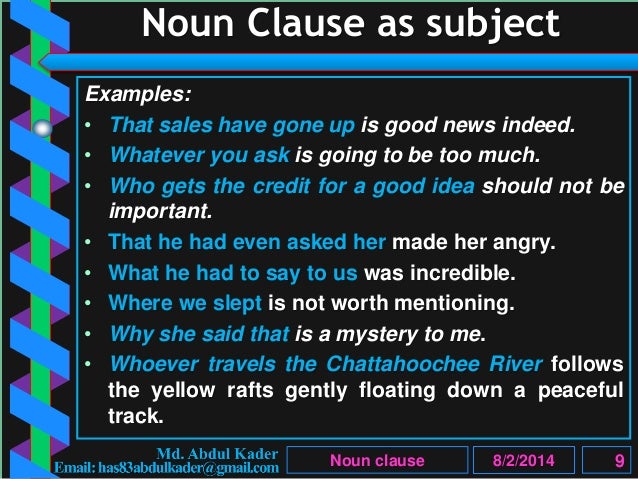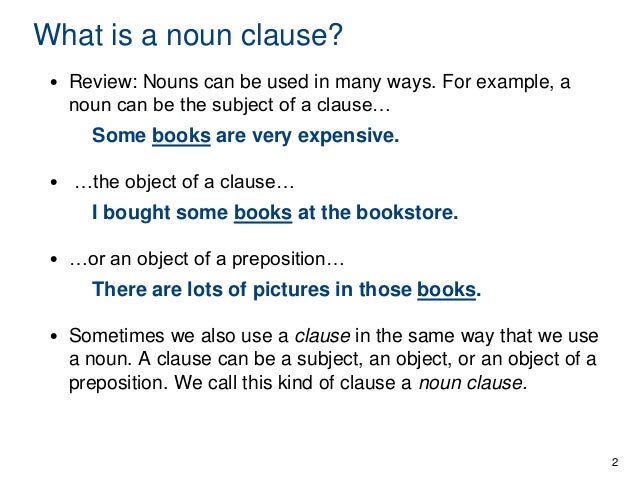What Is Noun Clause With Examples : Nouns - ESL Grammar - What does noun clause mean?
What Is Noun Clause With Examples : Nouns - ESL Grammar - What does noun clause mean?. A noun clause starts with a conjunction like that, what, who, which, how, why, whom, whose, when, where, whether, whenever, wherever, whichever, if … example: The clauses given below are all examples of noun clauses. It can be the subject of a example 2. Noun clauses can also be an object of a preposition. It can be used as the subject, direct object, indirect object, object of a preposition, subject complement, or appositive.
Here is a sentence with two more noun clauses: You must choose which flavor of ice cream you want. There are a lot of ways that you can communicate and one of it is writing. Noun clauses have words like; Noun clauses as an indirect object:

The noun clause is a clause that functions like a noun in the sentence.
The following italicized clauses are examples of finite noun clauses A clause is a group of words containing a subject and a verb. A person who trusts no one can't be trusted. A noun clause is that contains a finite verb and functioning like a noun within a sentences. That she did not pass the exam is obvious at this point. It can be used as the subject, direct object, indirect object, object of a preposition, subject complement, or appositive. A noun clause is a clause that plays the role of a noun. A noun clause starts with a conjunction like that, what, who, which, how, why, whom, whose, when, where, whether, whenever, wherever, whichever, if … example: Noun clauses usually begin with words called relative pronouns such as how, that, what, whatever, when, where, which, who, whoever, and why. A noun clause is a dependent clause that contains a subject and a verb. I include many example sentences. A noun clause is a dependent clause that functions as a noun. How to identify a noun clause.
Examples and definition of a noun clause. Examples of noun clause showed here in bold. What is a noun clause? In this lesson, we'll look at the dependent clause and its. Noun clauses as an indirect object:

In other words, a noun clause does not stand alone as a complete thought.
A noun clause is a dependent clause that functions as a noun. Martha will give whoever she sees there her old bag. A noun clause is a dependent clause that takes the place of any noun in the sentence, whether they are subjects, objects, or subject complements. I include many example sentences. A noun clause is a clause (containing a subject and a verb) that can replace a noun. Whatever, whichever, whoever, whomever, how, what, when which, whether, whom for example, the village where i live is a good place for farming. A noun clause is a clause that plays the role of a noun. Check out our page and find our noun clause examples and learn how to weave a noun clause into your own writing. For example (noun clauses shaded): Noun clauses usually begin with words called relative pronouns such as how, that, what, whatever, when, where, which, who, whoever, and why. Noun clauses have words like; (this noun clause is the subject of the sentence.) Examples of noun clause showed here in bold.
However, it cannot stand alone as a sentence. What is a noun clause? The examples below show how they are used: Noun clauses usually begin with words called relative pronouns such as how, that, what, whatever, when, where, which, who, whoever, and why. Noun clauses are subordinate or dependent clauses that are formed by a subordinating conjunction followed by a clause.

How to identify a noun clause.
A noun clause is a clause that plays the role of a noun. In this example, the noun clause is the object of the sentence. A noun clause functions as noun in a sentence. It can be used as the subject, direct object, indirect object, object of a preposition, subject complement, or appositive. Since noun clauses stand for nouns in a sentence, you can usually check your work by replacing the clause with a regular noun. You must choose which flavor of ice cream you want. A noun clause is a group of words that contains a subject and a verb; Here the noun clause 'what she thinks' acts as the object of the verb know. Noun clauses are subordinate clauses or dependent clauses that perform eight grammatical functions. Subordinate clauses (embedded clauses, dependent clauses) are those that would be awkward or incomplete if examples like these demonstrate that how a clause functions cannot be known based entirely on a the following examples illustrate argument clauses that provide the content of a noun. Noun clauses have words like; Dependent clauses can function either as noun clauses, adjective clauses, or adverb clauses. Like all clauses, a noun clause contains a subject (sometimes represented by one of the words above) and a predicate (a verb and any additional information attached to it).
Noun clauses have words like; what is noun clause. Nouns can function as subjects, direct objects, indirect objects, object of the preposition, and predicate nominatives.